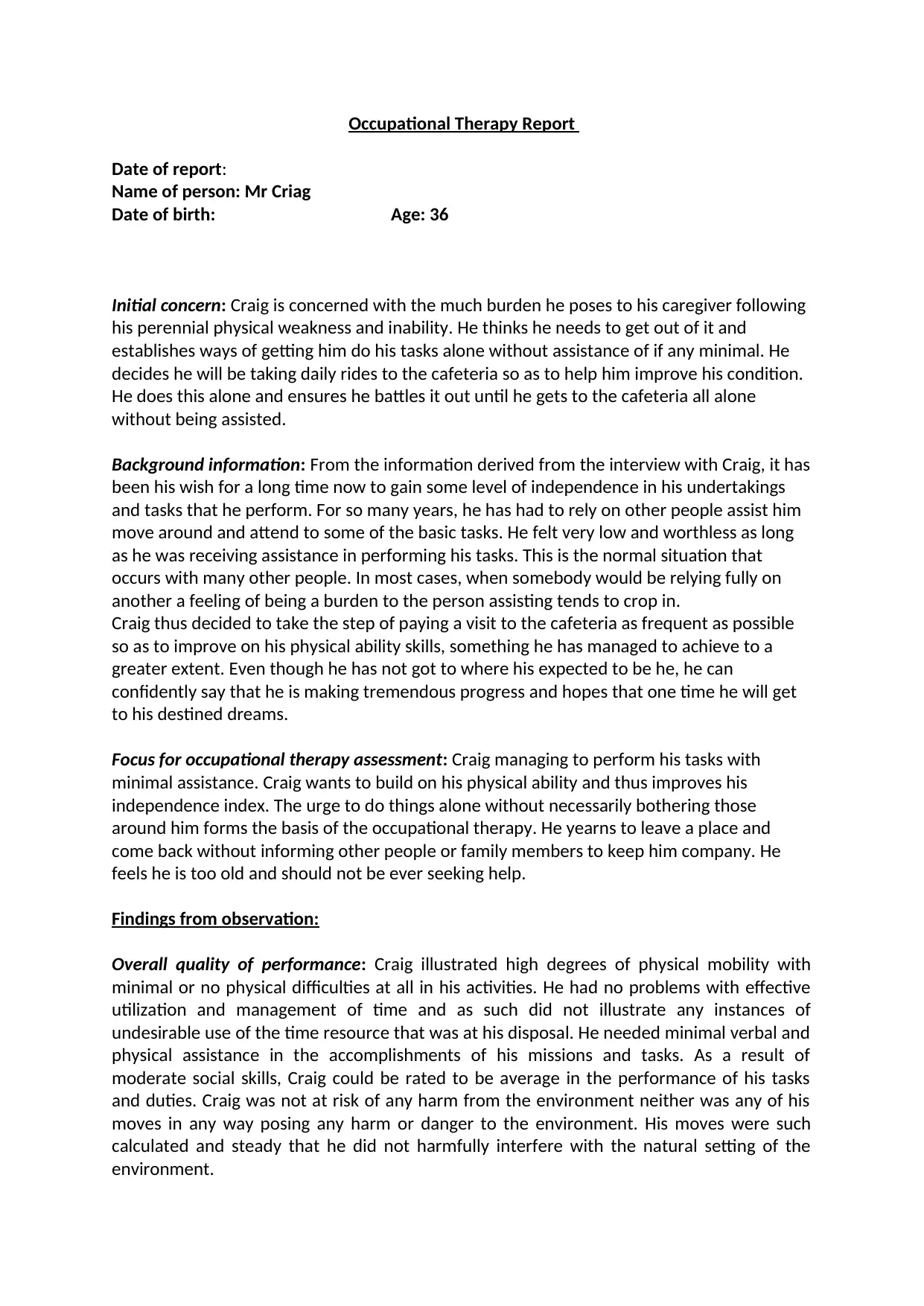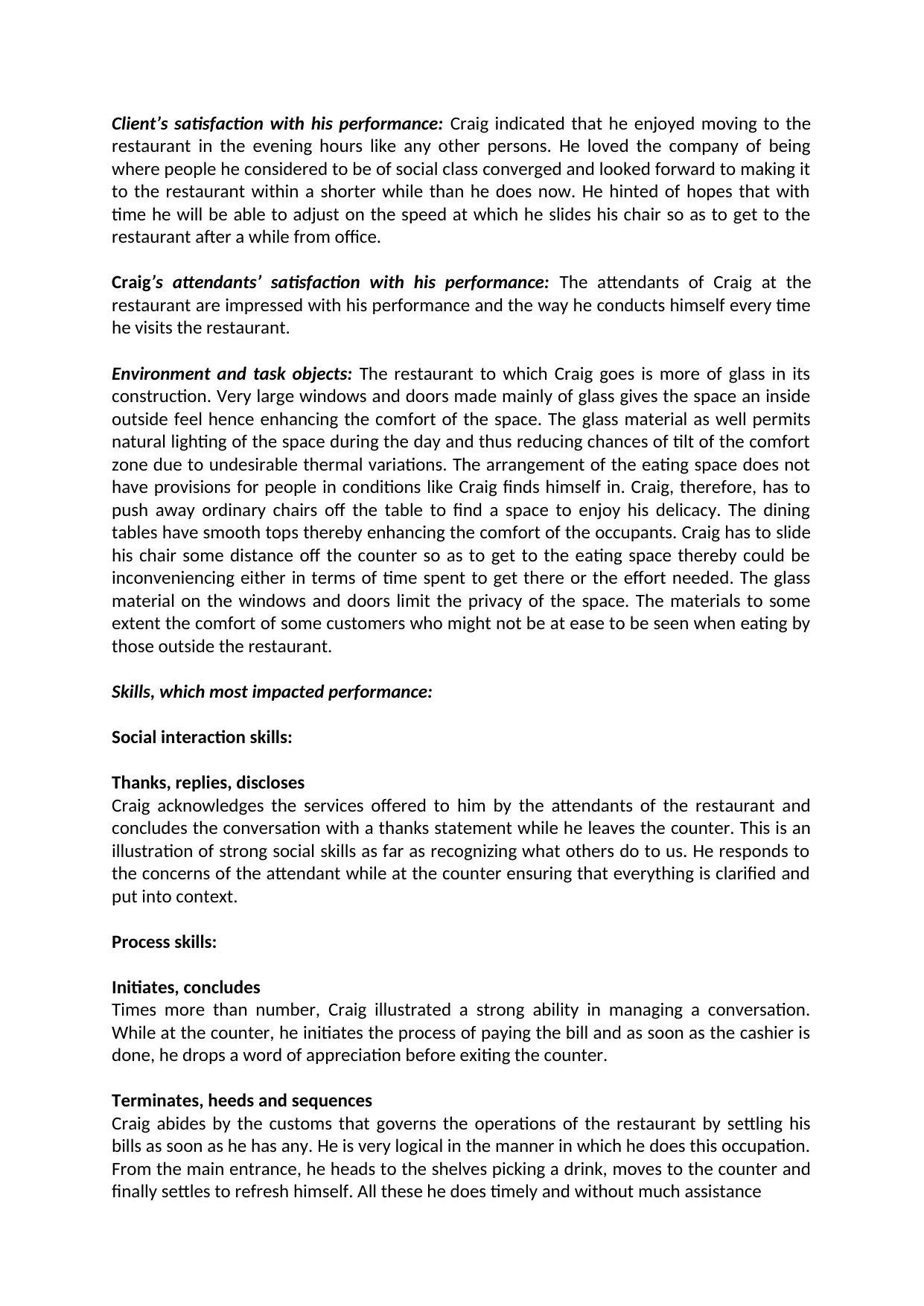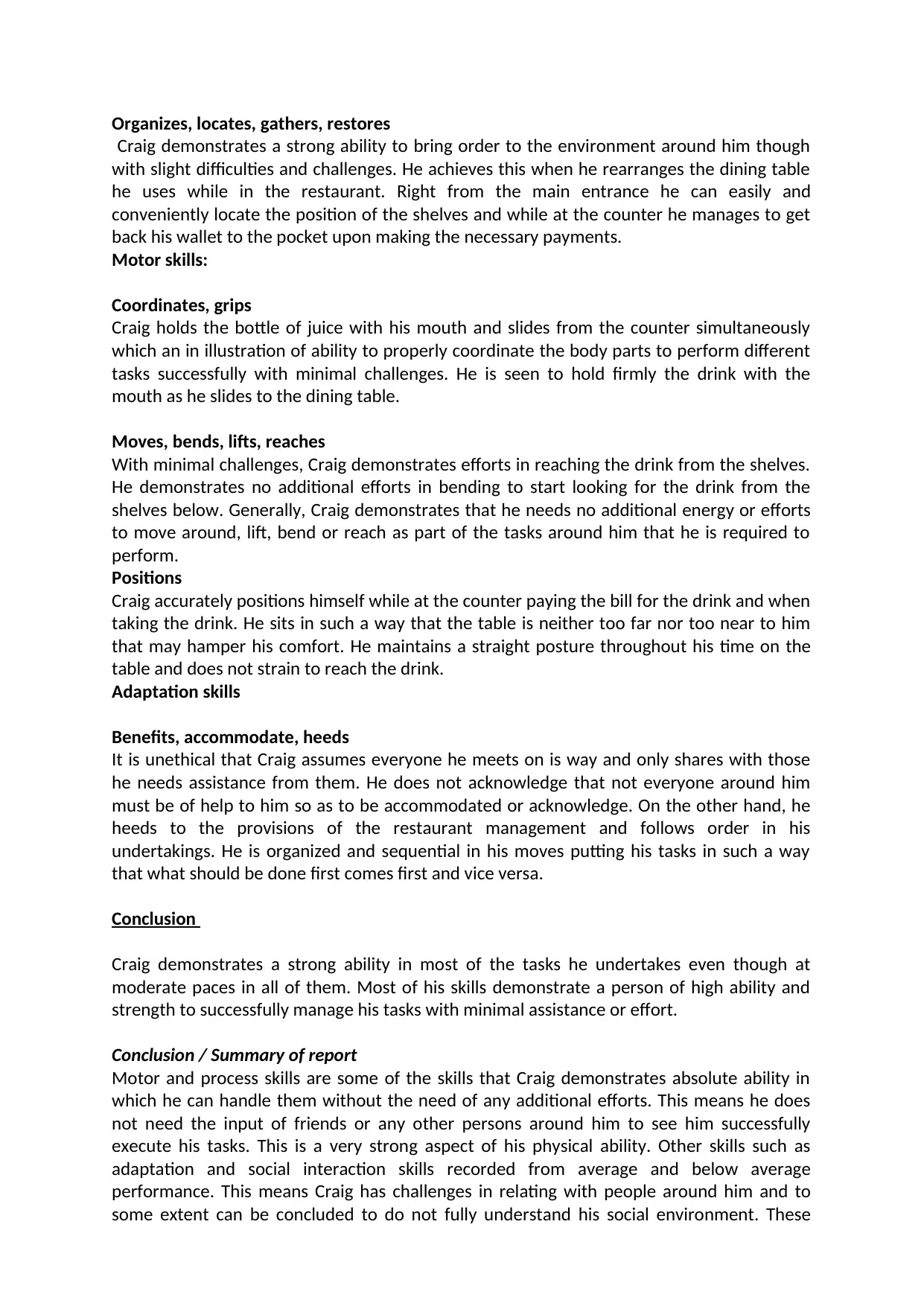Occupational Therapy Report: Evaluating Mr. Craig's Daily Performance
VerifiedAdded on 2020/05/28
|4
|1748
|135
Report
AI Summary
This occupational therapy report details the assessment of Mr. Craig, focusing on his desire for increased independence and his ability to perform daily tasks with minimal assistance. The report outlines background information, including Mr. Craig's long-standing wish to be less reliant on others. It analyzes his performance through observation, noting his physical mobility, time management, and social skills. The assessment also considers his satisfaction and that of restaurant staff, where he frequently visits to improve his physical abilities. The report examines the environment and task objects, such as the restaurant layout, and evaluates skills impacting performance, including social interaction, process, motor, and adaptation skills. Key findings indicate strong motor and process skills but challenges in social interaction and adaptation. The conclusion highlights Mr. Craig's overall progress towards independence and the need for improvement in social skills. It emphasizes his ability to manage tasks with minimal assistance and his understanding of societal customs.

Occupational Therapy Report
Date of report:
Name of person: Mr Criag
Date of birth: Age: 36
Initial concern: Craig is concerned with the much burden he poses to his caregiver following
his perennial physical weakness and inability. He thinks he needs to get out of it and
establishes ways of getting him do his tasks alone without assistance of if any minimal. He
decides he will be taking daily rides to the cafeteria so as to help him improve his condition.
He does this alone and ensures he battles it out until he gets to the cafeteria all alone
without being assisted.
Background information: From the information derived from the interview with Craig, it has
been his wish for a long time now to gain some level of independence in his undertakings
and tasks that he perform. For so many years, he has had to rely on other people assist him
move around and attend to some of the basic tasks. He felt very low and worthless as long
as he was receiving assistance in performing his tasks. This is the normal situation that
occurs with many other people. In most cases, when somebody would be relying fully on
another a feeling of being a burden to the person assisting tends to crop in.
Craig thus decided to take the step of paying a visit to the cafeteria as frequent as possible
so as to improve on his physical ability skills, something he has managed to achieve to a
greater extent. Even though he has not got to where his expected to be he, he can
confidently say that he is making tremendous progress and hopes that one time he will get
to his destined dreams.
Focus for occupational therapy assessment: Craig managing to perform his tasks with
minimal assistance. Craig wants to build on his physical ability and thus improves his
independence index. The urge to do things alone without necessarily bothering those
around him forms the basis of the occupational therapy. He yearns to leave a place and
come back without informing other people or family members to keep him company. He
feels he is too old and should not be ever seeking help.
Findings from observation:
Overall quality of performance: Craig illustrated high degrees of physical mobility with
minimal or no physical difficulties at all in his activities. He had no problems with effective
utilization and management of time and as such did not illustrate any instances of
undesirable use of the time resource that was at his disposal. He needed minimal verbal and
physical assistance in the accomplishments of his missions and tasks. As a result of
moderate social skills, Craig could be rated to be average in the performance of his tasks
and duties. Craig was not at risk of any harm from the environment neither was any of his
moves in any way posing any harm or danger to the environment. His moves were such
calculated and steady that he did not harmfully interfere with the natural setting of the
environment.
Date of report:
Name of person: Mr Criag
Date of birth: Age: 36
Initial concern: Craig is concerned with the much burden he poses to his caregiver following
his perennial physical weakness and inability. He thinks he needs to get out of it and
establishes ways of getting him do his tasks alone without assistance of if any minimal. He
decides he will be taking daily rides to the cafeteria so as to help him improve his condition.
He does this alone and ensures he battles it out until he gets to the cafeteria all alone
without being assisted.
Background information: From the information derived from the interview with Craig, it has
been his wish for a long time now to gain some level of independence in his undertakings
and tasks that he perform. For so many years, he has had to rely on other people assist him
move around and attend to some of the basic tasks. He felt very low and worthless as long
as he was receiving assistance in performing his tasks. This is the normal situation that
occurs with many other people. In most cases, when somebody would be relying fully on
another a feeling of being a burden to the person assisting tends to crop in.
Craig thus decided to take the step of paying a visit to the cafeteria as frequent as possible
so as to improve on his physical ability skills, something he has managed to achieve to a
greater extent. Even though he has not got to where his expected to be he, he can
confidently say that he is making tremendous progress and hopes that one time he will get
to his destined dreams.
Focus for occupational therapy assessment: Craig managing to perform his tasks with
minimal assistance. Craig wants to build on his physical ability and thus improves his
independence index. The urge to do things alone without necessarily bothering those
around him forms the basis of the occupational therapy. He yearns to leave a place and
come back without informing other people or family members to keep him company. He
feels he is too old and should not be ever seeking help.
Findings from observation:
Overall quality of performance: Craig illustrated high degrees of physical mobility with
minimal or no physical difficulties at all in his activities. He had no problems with effective
utilization and management of time and as such did not illustrate any instances of
undesirable use of the time resource that was at his disposal. He needed minimal verbal and
physical assistance in the accomplishments of his missions and tasks. As a result of
moderate social skills, Craig could be rated to be average in the performance of his tasks
and duties. Craig was not at risk of any harm from the environment neither was any of his
moves in any way posing any harm or danger to the environment. His moves were such
calculated and steady that he did not harmfully interfere with the natural setting of the
environment.
Paraphrase This Document
Need a fresh take? Get an instant paraphrase of this document with our AI Paraphraser

Client’s satisfaction with his performance: Craig indicated that he enjoyed moving to the
restaurant in the evening hours like any other persons. He loved the company of being
where people he considered to be of social class converged and looked forward to making it
to the restaurant within a shorter while than he does now. He hinted of hopes that with
time he will be able to adjust on the speed at which he slides his chair so as to get to the
restaurant after a while from office.
Craig’s attendants’ satisfaction with his performance: The attendants of Craig at the
restaurant are impressed with his performance and the way he conducts himself every time
he visits the restaurant.
Environment and task objects: The restaurant to which Craig goes is more of glass in its
construction. Very large windows and doors made mainly of glass gives the space an inside
outside feel hence enhancing the comfort of the space. The glass material as well permits
natural lighting of the space during the day and thus reducing chances of tilt of the comfort
zone due to undesirable thermal variations. The arrangement of the eating space does not
have provisions for people in conditions like Craig finds himself in. Craig, therefore, has to
push away ordinary chairs off the table to find a space to enjoy his delicacy. The dining
tables have smooth tops thereby enhancing the comfort of the occupants. Craig has to slide
his chair some distance off the counter so as to get to the eating space thereby could be
inconveniencing either in terms of time spent to get there or the effort needed. The glass
material on the windows and doors limit the privacy of the space. The materials to some
extent the comfort of some customers who might not be at ease to be seen when eating by
those outside the restaurant.
Skills, which most impacted performance:
Social interaction skills:
Thanks, replies, discloses
Craig acknowledges the services offered to him by the attendants of the restaurant and
concludes the conversation with a thanks statement while he leaves the counter. This is an
illustration of strong social skills as far as recognizing what others do to us. He responds to
the concerns of the attendant while at the counter ensuring that everything is clarified and
put into context.
Process skills:
Initiates, concludes
Times more than number, Craig illustrated a strong ability in managing a conversation.
While at the counter, he initiates the process of paying the bill and as soon as the cashier is
done, he drops a word of appreciation before exiting the counter.
Terminates, heeds and sequences
Craig abides by the customs that governs the operations of the restaurant by settling his
bills as soon as he has any. He is very logical in the manner in which he does this occupation.
From the main entrance, he heads to the shelves picking a drink, moves to the counter and
finally settles to refresh himself. All these he does timely and without much assistance
restaurant in the evening hours like any other persons. He loved the company of being
where people he considered to be of social class converged and looked forward to making it
to the restaurant within a shorter while than he does now. He hinted of hopes that with
time he will be able to adjust on the speed at which he slides his chair so as to get to the
restaurant after a while from office.
Craig’s attendants’ satisfaction with his performance: The attendants of Craig at the
restaurant are impressed with his performance and the way he conducts himself every time
he visits the restaurant.
Environment and task objects: The restaurant to which Craig goes is more of glass in its
construction. Very large windows and doors made mainly of glass gives the space an inside
outside feel hence enhancing the comfort of the space. The glass material as well permits
natural lighting of the space during the day and thus reducing chances of tilt of the comfort
zone due to undesirable thermal variations. The arrangement of the eating space does not
have provisions for people in conditions like Craig finds himself in. Craig, therefore, has to
push away ordinary chairs off the table to find a space to enjoy his delicacy. The dining
tables have smooth tops thereby enhancing the comfort of the occupants. Craig has to slide
his chair some distance off the counter so as to get to the eating space thereby could be
inconveniencing either in terms of time spent to get there or the effort needed. The glass
material on the windows and doors limit the privacy of the space. The materials to some
extent the comfort of some customers who might not be at ease to be seen when eating by
those outside the restaurant.
Skills, which most impacted performance:
Social interaction skills:
Thanks, replies, discloses
Craig acknowledges the services offered to him by the attendants of the restaurant and
concludes the conversation with a thanks statement while he leaves the counter. This is an
illustration of strong social skills as far as recognizing what others do to us. He responds to
the concerns of the attendant while at the counter ensuring that everything is clarified and
put into context.
Process skills:
Initiates, concludes
Times more than number, Craig illustrated a strong ability in managing a conversation.
While at the counter, he initiates the process of paying the bill and as soon as the cashier is
done, he drops a word of appreciation before exiting the counter.
Terminates, heeds and sequences
Craig abides by the customs that governs the operations of the restaurant by settling his
bills as soon as he has any. He is very logical in the manner in which he does this occupation.
From the main entrance, he heads to the shelves picking a drink, moves to the counter and
finally settles to refresh himself. All these he does timely and without much assistance

Organizes, locates, gathers, restores
Craig demonstrates a strong ability to bring order to the environment around him though
with slight difficulties and challenges. He achieves this when he rearranges the dining table
he uses while in the restaurant. Right from the main entrance he can easily and
conveniently locate the position of the shelves and while at the counter he manages to get
back his wallet to the pocket upon making the necessary payments.
Motor skills:
Coordinates, grips
Craig holds the bottle of juice with his mouth and slides from the counter simultaneously
which an in illustration of ability to properly coordinate the body parts to perform different
tasks successfully with minimal challenges. He is seen to hold firmly the drink with the
mouth as he slides to the dining table.
Moves, bends, lifts, reaches
With minimal challenges, Craig demonstrates efforts in reaching the drink from the shelves.
He demonstrates no additional efforts in bending to start looking for the drink from the
shelves below. Generally, Craig demonstrates that he needs no additional energy or efforts
to move around, lift, bend or reach as part of the tasks around him that he is required to
perform.
Positions
Craig accurately positions himself while at the counter paying the bill for the drink and when
taking the drink. He sits in such a way that the table is neither too far nor too near to him
that may hamper his comfort. He maintains a straight posture throughout his time on the
table and does not strain to reach the drink.
Adaptation skills
Benefits, accommodate, heeds
It is unethical that Craig assumes everyone he meets on is way and only shares with those
he needs assistance from them. He does not acknowledge that not everyone around him
must be of help to him so as to be accommodated or acknowledge. On the other hand, he
heeds to the provisions of the restaurant management and follows order in his
undertakings. He is organized and sequential in his moves putting his tasks in such a way
that what should be done first comes first and vice versa.
Conclusion
Craig demonstrates a strong ability in most of the tasks he undertakes even though at
moderate paces in all of them. Most of his skills demonstrate a person of high ability and
strength to successfully manage his tasks with minimal assistance or effort.
Conclusion / Summary of report
Motor and process skills are some of the skills that Craig demonstrates absolute ability in
which he can handle them without the need of any additional efforts. This means he does
not need the input of friends or any other persons around him to see him successfully
execute his tasks. This is a very strong aspect of his physical ability. Other skills such as
adaptation and social interaction skills recorded from average and below average
performance. This means Craig has challenges in relating with people around him and to
some extent can be concluded to do not fully understand his social environment. These
Craig demonstrates a strong ability to bring order to the environment around him though
with slight difficulties and challenges. He achieves this when he rearranges the dining table
he uses while in the restaurant. Right from the main entrance he can easily and
conveniently locate the position of the shelves and while at the counter he manages to get
back his wallet to the pocket upon making the necessary payments.
Motor skills:
Coordinates, grips
Craig holds the bottle of juice with his mouth and slides from the counter simultaneously
which an in illustration of ability to properly coordinate the body parts to perform different
tasks successfully with minimal challenges. He is seen to hold firmly the drink with the
mouth as he slides to the dining table.
Moves, bends, lifts, reaches
With minimal challenges, Craig demonstrates efforts in reaching the drink from the shelves.
He demonstrates no additional efforts in bending to start looking for the drink from the
shelves below. Generally, Craig demonstrates that he needs no additional energy or efforts
to move around, lift, bend or reach as part of the tasks around him that he is required to
perform.
Positions
Craig accurately positions himself while at the counter paying the bill for the drink and when
taking the drink. He sits in such a way that the table is neither too far nor too near to him
that may hamper his comfort. He maintains a straight posture throughout his time on the
table and does not strain to reach the drink.
Adaptation skills
Benefits, accommodate, heeds
It is unethical that Craig assumes everyone he meets on is way and only shares with those
he needs assistance from them. He does not acknowledge that not everyone around him
must be of help to him so as to be accommodated or acknowledge. On the other hand, he
heeds to the provisions of the restaurant management and follows order in his
undertakings. He is organized and sequential in his moves putting his tasks in such a way
that what should be done first comes first and vice versa.
Conclusion
Craig demonstrates a strong ability in most of the tasks he undertakes even though at
moderate paces in all of them. Most of his skills demonstrate a person of high ability and
strength to successfully manage his tasks with minimal assistance or effort.
Conclusion / Summary of report
Motor and process skills are some of the skills that Craig demonstrates absolute ability in
which he can handle them without the need of any additional efforts. This means he does
not need the input of friends or any other persons around him to see him successfully
execute his tasks. This is a very strong aspect of his physical ability. Other skills such as
adaptation and social interaction skills recorded from average and below average
performance. This means Craig has challenges in relating with people around him and to
some extent can be concluded to do not fully understand his social environment. These
⊘ This is a preview!⊘
Do you want full access?
Subscribe today to unlock all pages.

Trusted by 1+ million students worldwide

skills as well need to be perfected to in order to see Craig become a better social being, a
character who acknowledges that everyone around him is important and valuable whether
they assist him or not.
Craig understands the value of cohesion and harmony among people and thus chooses to
abide by the imaginary customs applicable in the society. This itself is a tremendous
progress as far as enhancing social interactions among the dwellers of a society is
concerned. Minimal harm to either him or the environment as he goes round his tasks
makes Craig a more independent man and one who does not require regular follow-ups.
character who acknowledges that everyone around him is important and valuable whether
they assist him or not.
Craig understands the value of cohesion and harmony among people and thus chooses to
abide by the imaginary customs applicable in the society. This itself is a tremendous
progress as far as enhancing social interactions among the dwellers of a society is
concerned. Minimal harm to either him or the environment as he goes round his tasks
makes Craig a more independent man and one who does not require regular follow-ups.
1 out of 4
Your All-in-One AI-Powered Toolkit for Academic Success.
+13062052269
info@desklib.com
Available 24*7 on WhatsApp / Email
![[object Object]](/_next/static/media/star-bottom.7253800d.svg)
Unlock your academic potential
Copyright © 2020–2026 A2Z Services. All Rights Reserved. Developed and managed by ZUCOL.


